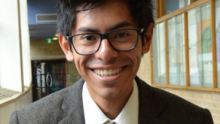 The recent decision by the Supreme Court of the US (SCOTUS) on marriage equality has been heralded as a milestone in addressing discrimination against people in same-sex partnerships and also broader issues of injustice affecting the lesbian, gay and bi-sexual, transgender, intersex, queer and allied (LGBTIQA) communities.
The recent decision by the Supreme Court of the US (SCOTUS) on marriage equality has been heralded as a milestone in addressing discrimination against people in same-sex partnerships and also broader issues of injustice affecting the lesbian, gay and bi-sexual, transgender, intersex, queer and allied (LGBTIQA) communities.
The implications for health care may not seem immediately obvious but as the author of the article below argues, “equality cannot happen without access to healthcare”. This means that access to health care must be considered as an integral part of achieving overall equality for the LGBTIQA communities.
The following piece by Asiel Adan Sanchez explores the significance of the SCOTUS decision and what this means for our health system in which many people who are LGBTIQA experience discrimination or unequal access to care due to their sexual or gender identity.
Asiel is a third year medical student at The University of Melbourne. He was an academic day convenor for The MD Student Conference, President of MDQueer LGBTIQ Health Collective and LGBTIQ Health Officer for the Australian Medical Students’ Association.
Asiel Adan Sanchez writes:
With the passing of marriage equality, the US has reached a milestone in the fight for equality. The impact of this decision was felt globally. Social media, in particular has exploded with more rainbows than Mardi Gras could ever hope for, an action which in itself has become a symbol of hope and acceptance for many in the LGBTIQA community.
While the legal fight for marriage equality continues in Australia, Dan Savage’s address at the recent MD Student Conference highlighted the need for doctors to join their voices in the progress towards equality.
An activist and prolific author, Dan is globally known for the It Gets Better Project, a movement he started with his husband. Gaining over 500,000 videos, the campaign aimed to inspire hope and provide support for isolated queer youth facing bullying. Our future health professionals are beginning to understand that equality cannot happen without healthcare.
At the core of this movement is progressive medical education. The MD Student Conference (MDSC) is a unique initiative: Entirely student run, with support and guidance from the Melbourne Medical School, MDSC gives a space for medical students to create their own academic conference. With a delegation of nearly 1,400 medical students, it provides a powerful advocacy platform to educate our future health professionals on issues which often don’t make it to the clinical curriculum, including LGBTIQA health.
It is increasingly apparent that medical knowledge alone is not enough. In order to provide equal healthcare to LGBTIQA communities, it is crucial that doctors complement their medical practice with a sociological understanding of sex, gender and sexuality, one which reflects the lived experiences of LGBTIAQ people. For example, anatomy is still taught in terms of “female” and “male” sexes, with little room for any variation. This implies that intersex bodies and physiology needs to be corrected to fit these categories.
Similarly, there is widespread systematic erasure of trans and gender diverse identities. In hospital systems everything from blood tests to intake forms fail to recognise the experiences of trans people. Even in relatively progressive fields such as sexual health, the breadth of human sexuality is approached from a biological perspective.
The dangerous implication of all this being that anything that does not fit within this medical discourse is abnormal, risky and needs to be corrected. Our current bio-medical model underpinning medical education leaves our health professionals widely unequipped to understand the healthcare needs of LGBTIQA people
Equality cannot happen without access to healthcare. Doctors should have the skills to interact with all LGBTIAQ individuals in a respectful, inclusive manner and making clinical settings welcoming spaces. This does not necessarily mean being an expert in the subtleties of gender identity. However, the simple act of widening our understanding of gender, sexual orientation and intersex status will go a long way. If there is to be equality in all aspects of healthcare, every doctor -from your radiologist to your surgeon to your GP- must treat LGBTIQA individuals with respect and know something about their lived experiences.
It is of paramount importance that medical students are exposed to material like Dan Savage’s insights on sex and sexuality and to hear from intersex, trans and queer advocates outside of a medical perspective. If our medical education includes a basic understanding on intersex, gender identity and sexual orientation, then we can ensure all future doctors, regardless of practice, can competently look after the health of our LGBTIQA communities.
While marriage equality is an important right, it is also just one amongst a number of injustices. Accessing healthcare without fear of discrimination or refusal is a basic human right and one which has to come from the medical profession itself. Through the MD Student Conference, medical students are already leading that change.
References
Leonard, W et al. Private Lives 2: The second national survey of the health and wellbeing of GLBT Australians. Melbourne: Australian Research Centre in Sex, Health and Society. La Trobe University; 2012.
Paul, M. Push for more transgender support for youths in regional Victoria, as Geelong hosts gender diverse summit. http://www.abc.net.au/news/2015-06-20/geelong-hosts-victorian-summit-for-transgender-youth/6559748
